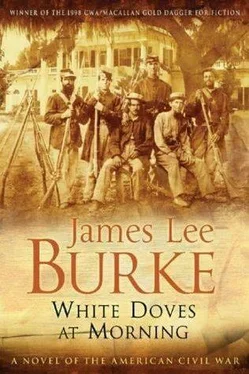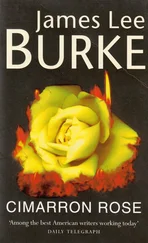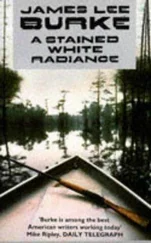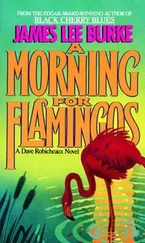"You're not going to cut bait on me, are you?" Willie asked.
"Both Jim's folks is passed?"
Willie nodded.
"Then I don't reckon they'll mind. I wish I was a darky," Elias said.
"Why's that?"
"'Cause I'd have an excuse for taking other people's orders all my life." Then he slapped the tops of his thighs and laughed and stomped his feet up and down in the grass. He laughed until a tear ran down from his empty eye socket. "Ain't this world a barrel of monkeys?"
"Take me to the grave," Willie said.
"Jim don't hold it against you 'cause you lived and he died."
Elias started to smile, then looked at Willie's expression and got up from the rock and arched a crick out of his back, his face deliberately empty.
The water in the creek was spring-fed and cold inside Willie's shoes as he and Elias waded across, a freshly carpentered, rope-handled box strung between them. The trees were widely spaced on the far side of the creek, the canopy thick, the ground gullied, crisp with leaves that had settled into the depressions scattered through the woods. Up the incline Elias studied an outcropping of rock that was cracked through the center by the trunk of a white oak tree.
He set down his end of the box. "We didn't have time to dig deep. Don't be surprised if animals has had their way with things," he said.
Willie opened the box and removed a shovel and a large square of sail canvas. He spread the canvas on the ground and began to dig at the base of the outcropping. The ground was carpeted with toadstools and mushrooms with purple skirts and moist from a spring farther up the incline. Overhead, squirrels clattered in the white oak and he felt himself begin to sweat inside his clothes. The soil he spaded to the side of the depression was dark and loose, like coffee grinds, and was churning with night-crawlers and smelled of decay and severed tree roots. The tip of Willie's shovel scraped across metal.
He got to his knees and began brushing the dirt from a copper-colored belt buckle embossed with the letters CSA, then his fingers touched cloth and wood buttons and the skeletal outline of a rib cage, wrist bones, and fingers that were like polished white twigs.
"His shoes are gone. When we put him in the ground I was sure his shoes was on. I didn't let nobody take Jim's shoes, Willie," Elias said.
"I know you didn't," Willie said.
"Maybe it ain't Jim. There was shooting going on in the trees and people running everywhere."
Willie hollowed the dirt away from the corpse's shoulders and arms and sides, then brushed at the face, touching a piece of cloth that had moldered into the features. He picked up the bottom of the fabric and peeled it back from the chin and nose and forehead and looked down into a face whose skin had turned gray and had shrunken tautly against the skull. The mouth was open and a tin identification tag, still attached to a leather cord, was wedged perpendicularly between the front teeth. Willie clasped the tag between his thumb and index finger and lifted it from the dead man's mouth.
Willie spit on the tag and rubbed it clean on his pants, then read the name on it and wrapped it carefully with the frayed leather cord that had held it around Jim's neck and placed it in his shirt pocket and buttoned his shirt flap on top of it.
Then he took Jim out of the grave and laid him on the piece of canvas. He could not believe how light Jim was, how reduced in density and size he had become. There was no smell of corruption in Jim's body, no odor at all, in fact. The spring water had washed the blood from the wounds in his head, and the wind touched his hair and his mouth seemed to form a word.
Where have you been, you Irish groghead?
Had to take care of a few Yanks, run them out of New Iberia, set General Banks straight about a few things. Ready to go home, you ole beanpole?
"You're giving me the crawlies," Elias said.
Willie folded the corners of the canvas across Jim's body and face and lifted him in both arms, then laid him down in the wood box, with the knees propped against one wall, the head bent against another.
Then, on his hands and knees, he shoved the dirt back into the hole at the foot of the outcropping, packing it down, smoothing it, raking leaves across the topsoil. When he had finished, he glanced up at Elias and saw a mixture of pity and sadness in his face.
"He carried the guidon. He was braver than me. I loved Jim and care not if anyone calls me a ghoul. To hell with them," Willie said.
"Oh, Willie, would that I could change your soul as easy as I can rub the burnt cork on my skin," Elias replied.
IRA Jamison never got over being surprised by the way white trash thought. He assumed their basic problem was genetic. They were born in ignorance and poverty, with no more chance of success than a snowball in a skillet, but as long as they were allowed to feel they were superior to Africans, they remained happy and stupid and believed anything they were told.
They worked from dawn to dusk on other people's farms, bought at the company store, lived in cabins a self-respecting owl wouldn't inhabit, saw their children grow up with rickets and rotted teeth, and with great pride became cannon fodder in wars whose causes had nothing to do with their lives.
Then a day came when, through chance or accident, the great scheme of things crashed on their heads like an asteroid.
What better example than Clay Hatcher, Ira Jamison thought. A man who had lived most of his life with expectations of a reward that most people would consider a punishment. More specifically, a lifetime spent coveting a desiccated, worm-eaten house that had so little structural value a man with heavy boots could kick it into kindling.
But Clay Hatcher was not most people and Angola Plantation was not the rest of the world. The house had four rooms, a cistern and a chicken run, and was built on a bluff overlooking the river. Its geographic prominence meant it went to only one person, the chief overseer. The homes of the other whites who worked on the plantation, now becoming known in the prison nomenclature as "free people," were situated down the back slope, at best on dry ground that didn't breed mosquitoes. Farther on, in acreage that never quite drained or was full of clay, were the old slave cabins, now used by convicts.
The house on the bluff was sunny in winter and cooled by a breeze off the river in summer. Mimosa trees bloomed in the front yard and peach trees in back. The soil was black and loamy, too, wheelbarrowed up from the compost heaps behind the barns, and the vegetable garden produced tomatoes as big as grapefruit.
Hatcher had knocked on the side door under the porte cochere, his battered excuse for a hat in his hand, his bottom lip crusted with a scab that looked like a black centipede.
"I hear Rufus is buying the property where the laundry was at in New Iberia," he said.
"That's right, Clay. Looks like Roof is about to become a gentleman planter," Jamison said.
"Then he'll be moving out directly?"
"Yes, directly it is."
Hatcher cut his head and grinned and fiddled with his hat, his gaze never quite meeting Jamison's.
"Reckon me and my old woman should get our things together, huh?" he said.
"I'm not following you."
"Seeing as how I'm second overseer, I figured you'd want me moving on into Rufus's place. It goes with the job, don't it?"
Jamison heard a boat on the river and looked in its direction. "You're a good man, Clay. But we're in the penal business now. An oldtime jail warden from New Orleans will be replacing Rufus. I'll be relying on you to get him oriented."
Hatcher turned his hat in his hands, his face reddening, his jawbones knotting, a band of sunlight slicing across his eyes.
"Oldtime jail warden, you say?" he said.
Читать дальше












